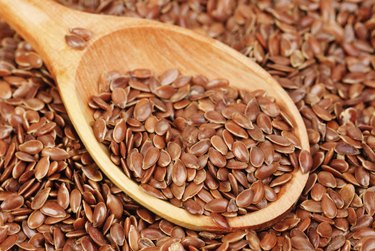
Ground flaxseeds supply essential omega-3 fatty acids and substances that act like estrogen called lignans. They also have the potential to cause diarrhea, but if you're careful about the amount you consume, you can gain the benefits and minimize the risks. Be aware that active ingredients in flaxseeds can interact with some medications and may not be safe for everyone, so consult your physician before adding ground flaxseeds to your diet.
Fiber in Flaxseed
Video of the Day
One good reason to add ground flaxseeds to your diet is to boost fiber consumption. On the flip side, fiber is the reason it may cause diarrhea, reports the University of Maryland Medical Center. A typical serving of ground flaxseed is 1/2 to 1 tablespoon in a smoothie, a bowl of oatmeal or one muffin. One tablespoon has about 2 grams of fiber, which includes a combination of soluble and insoluble fiber. Insoluble fiber is known for helping pass stools. Some of the soluble fiber is in the form of a substance called mucilage, which also has a laxative effect. The amount of fiber in just 1 tablespoon of ground flaxseed provides 8 percent of women's recommended intake and 5 percent of men's daily fiber.
Video of the Day
Impact on Digestive Tract
Ground flaxseed may increase the number of bowel movements you have each day or may cause the more extreme side effect of diarrhea. In fact, it's actually used as a laxative to treat constipation, according to the University of Maryland Medical Center. You may also experience other gastrointestinal side effects, such as nausea, gas, bloating, abdominal pain and a stomachache. Ground flaxseed works as a bulk-forming laxative, which means it absorbs water and makes larger, softer stools. This type of laxative can have the opposite effect, however, and block your intestine if you consume too much.
Minimize Side Effects
If you don't know how much fiber you normally consume, track it for a few days to be sure the fiber in ground flaxseed doesn't add more than you need. Your total daily fiber consumption from all sources should not exceed the recommended intake unless it's under the supervision of your physician. The best way to add ground flaxseed to your diet is to begin with a small amount and increase it very gradually. This slow process gives your body time to adjust and reduces the risk of diarrhea and other gastrointestinal problems. It's also essential to drink at least eight glasses of water or caffeine-free beverages every day to avoid an intestinal blockage.
Safety Concerns
The lignans in flaxseed may not be safe for women who are pregnant or breast feeding. Because its active ingredients may impair blood clotting, affect blood sugar or exert an estrogenlike effect, talk to your doctor before consuming ground flaxseed if you have a bleeding disorder, diabetes or a hormone-sensitive medical condition. Steer clear of flaxseed if you take medications such as diuretics, acetaminophen or other nonsteroidal anti-inflammatory drugs because it may interact with them. You should also avoid ground flaxseed if you have a swollen esophagus or a history of any type of intestinal blockage.
- New York University Langone Medical Center: Flaxseed
- University of Maryland Medical Center: Flaxseed
- USDA National Nutrient Database: Seeds, Flaxseeds
- MedlinePlus: Flaxseed
- Family Doctor: Laxatives: OTC Products for Constipation
- University of California, Davis: Some Facts About Fiber
- Harvard University Health Services: Fiber Content of Foods in Common Portions
- MedlinePlus: Healthy Food Trends: Flaxseeds